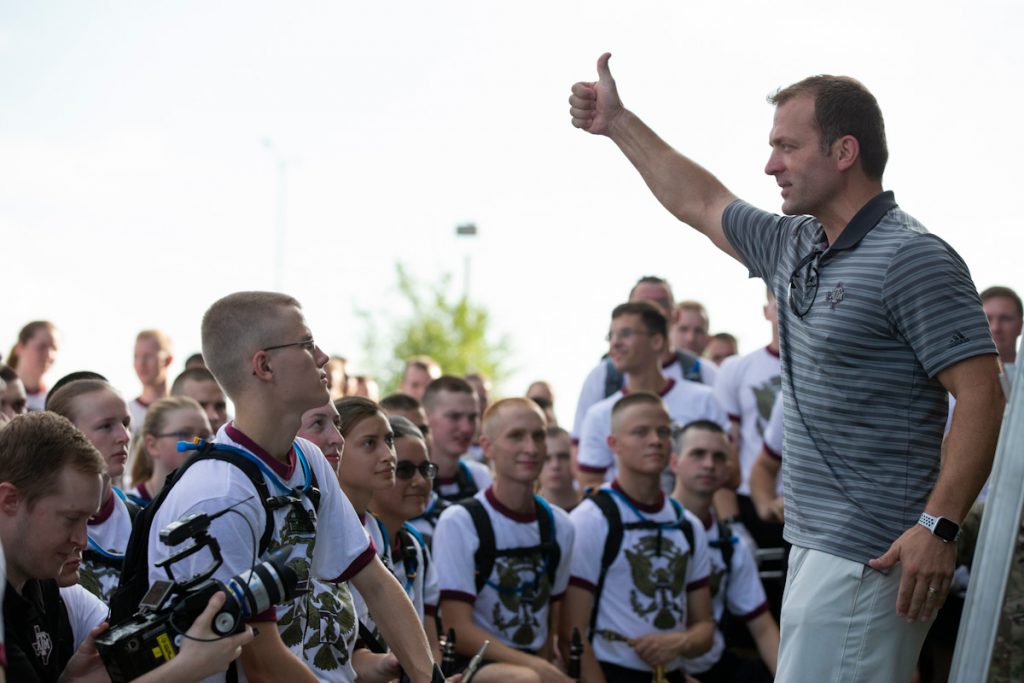
“My overall philosophy on scheduling is win, that should be the first thing. Then it’s all situational based on the institution. At Western Kentucky, I did things differently than at Ole Miss, and now at Texas A&M.” -Texas A&M AD Ross Bjork
Ross Bjork began his position as Texas A&M’s Director of Athletics in July of 2019. He says he’s still learning about the ins and out of scheduling at his new post, but says the school has a good formula.
“We play in the toughest conference in the toughest division in college football, it’s the hardest to compete against. That’s our foundation, we have eight unbelievably competitive highest-level football games possible. Then there’s a requirement that we play a Power 5 non-conference opponent, with that comes flexibility to pick and choose what’s best for your program,” Bjork said.
He tells CollegeAD he does not believe there should be a uniform scheduling policy until there is a commissioner of college football, which he’s not sure is needed.
“I think this system allows colleges the flexibility that they need in order to promote their brand and grow their conference in order to be competitive in their own environment.”
 In Bjork’s first 100 days on the job, he’s taken an astounding 400 plus meetings with staff and coaches, individual donors, system and university personnel, speaking engagements, staff and candidate interviews, and meetings with local and regional community leaders.
In Bjork’s first 100 days on the job, he’s taken an astounding 400 plus meetings with staff and coaches, individual donors, system and university personnel, speaking engagements, staff and candidate interviews, and meetings with local and regional community leaders.
“My goal going in was to be very strategic and to go as fast as I could in those first 100 days,” Bjork explained. “I wanted to be as active as possible, especially knowing that in July and August, I don’t have games, I don’t have university events, so try to meet people early on.”
He went on to say that he wanted to build relationships and get to know the culture, the institution, and the community. Ross Bjork came to Texas A&M from Ole Miss and before that served as AD at Western Kentucky. He explains that every position along the way has helped prepare him for where he is now.
“I really learned how to set priorities. When you’re a new AD, you want to just take charge of everything. But I’ve learned there are some things that weren’t near as important as I thought they were and there are other things that are way more important. I had to realize that along the way. “
He also said another thing became crystal clear once he sat in the big chair, his words carry weight.
“Everything the AD says will be taken as gospel. I had a mentor say that to meet when I got to Western Kentucky, to be careful with my words. So, no more hallway conversations or off-the-cuff comments. That doesn’t mean you have to be a robot, but you have to be measured in everything that you say because if the ‘AD said it so it must be true’ even if you just had this idea, you have to have a filter.”
Texas A&M was one of the first schools in the SEC to offer alcohol once the conference gave the ok. They expanded the purchase of beer and wine to the general public at Kyle Field, and Bjork says they are looking into doing the same at other sporting events.
“We should have a decision for basketball, softball, and baseball pretty soon to see how we will operate things. It’s so far so good on the operation and logistics side of alcohol sales at Kyle Field. The revenue is a little ahead of our projections.”
Bjork also weighed in on the recent moves towards player being in control of their name, image, and likeness. He believes the NCAA can tackle this issue.
“We, we being the NCAA, can put the right programs in place, but I think that’s where the narrative and public opinion in the NCAA, well that’s where we’ve lost confidence. I hope we can get that back; I hope can come together as an association and have the right kind of principles. I do believe that the NCAA is the right platform to do that and we should be given a chance to do that.”
He went on to say, if the NCAA can’t put something in place on NIL then the issue will have to go to the federal government because there cannot be different rules in each state.
“I think this a pivotal moment and a very historic moment in college athletics. I do believe it’s a positive step in the modernization of the rules and the opportunities that should be available for the student-athletes. As this process moves forward, I think it’s very important we maintain the improvements in higher education and college athletics that really impact the student-athlete so they can have an educational experience and reach their full potential. In terms of NIL, we don’t know what that is yet, but I think it ought to fit the collegiate athletic model.”
